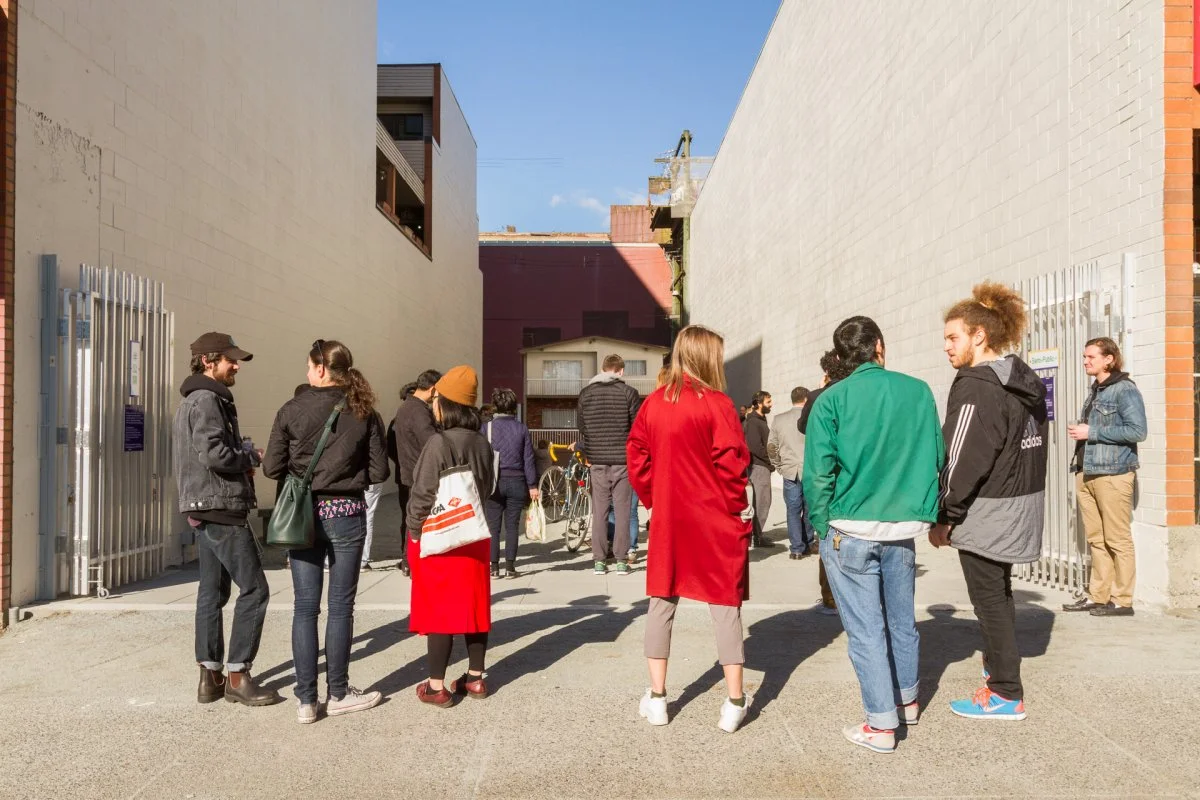Progress for 221A's Cultural Land Trust proposal as Vancouver City Council backs motion
City backs removing barriers to artist studios, while new working group will devote further research into providing arts sector with vital real-estate support
Opening of public artwork by Ken Lum, commissioned by 221A at 271 Union Street in Vancouver, 2015. Photo by Dennis Ha, courtesy of 221A
ANOTHER STEP FORWARD (albeit a small one) has been made in Vancouver-based nonprofit organization 221A’s endeavour to establish a Cultural Land Trust in B.C., and it comes in the form of a new Vancouver City Council motion.
A Cultural Land Trust is an independent nonprofit entity that’s able to purchase and manage land, which would offer Vancouver’s arts and culture sector vital financial support in a real-estate market where prices are continuously escalating. More specifically, the initiative would provide local artists and arts organizations with stable rent, long-term leases, and pathways to ownership.
At a meeting on May 29, Vancouver City Council resolved “to form an interdepartmental working group and report back with recommendations for how the City of Vancouver can support the development of an independent, not for profit Cultural Land Trust, taking into consideration the learning from 221A and other community partners, to protect and expand affordable arts and culture spaces in Vancouver in a financially and operationally sustainable way over the long term.”
While no funding has been specifically allocated to the cause yet, the recent decision to create a working group highlights the city’s interest in a Cultural Land Trust, a model which has been successfully implemented around the world in cities spanning London, Seattle, Austin, San Francisco, and Oakland.
“I think ultimately, this is about getting the new city council to really buy into the idea,” 221A’s cofounder and executive director Brian McBay tells Stir over a phone call, “which would put wind behind the back of not only community members, but hopefully the city’s own internal staff. Because some of them may not see it as a priority—and you do need to have different departments working together at the city.”
The motion was moved by Councillor Christine Boyle, who McBay says reached out to him before the Council meeting about what “seemed like an initiative, really, to kind of refresh a pre-existing City Council priority.” The motion was seconded by Councillor Sarah Kirby-Yung.
In 2019, Vancouver City Council put forth its Making Space for Arts and Culture: Vancouver Cultural Infrastructure Plan, which outlined some of the challenges the city’s arts and culture sector had been facing and suggested implementing goals to improve them.
Now, five years later, some of those goals may come to fruition. The minutes for last week’s Vancouver City Council meeting state that staff will report back this fall on “recommendations for fulfilling the action items” in the plan.
Two of those action items are “Removing regulatory barriers and providing regulatory support for arts and culture groups navigating permitting, renovations, and development of their spaces”, and “Exploring community amenity or zoning reform tools in industrial and commercial zoning areas that would result in additional creation or retention of arts and culture spaces”, both of which address recent concerns raised by the Eastside Arts Society in its 2019 report, A City Without Art? No Net Loss, Plus!.
The report found that throughout the Eastside Arts District in the past decade, over 400,000 square feet of artist production spaces, music and performing-arts venues, and art galleries had been lost, and that studio space rental rates had increased by 65 percent. In a recent video by 221A made in collaboration with local urban-planning journalist Uytae Lee (see at bottom), a Cultural Land Trust is suggested as a solution to the worsening art space crisis.
In order to ensure a potential Cultural Land Trust’s success, a third action item cited in the Council minutes would focus on “creating or re-focusing specific City of Vancouver staff positions within Development, Buildings and Licensing, with the unique knowledge and skills needed to support arts and culture groups in navigating permitting, renovations and development.”
When Stir spoke to McBay in April, he shared that 221A estimated between $80 and $120 million in funding would be needed over the course of 10 years to meet the organization’s goal of securing 30 properties by 2050—and those figures were based on property costs from 2021, which have since risen. In order to kickstart the Cultural Land Trust, 221A is seeking an initial $15 million in seed funding through contributions from B.C.’s federal, provincial, and municipal governments.
While the news from the Council meeting comes as a welcome bit of progress, McBay notes that it remains to be seen how the situation will unfold from here—it’s not yet certain whether the City’s working group will move on the idea to fund the Cultural Land Trust.
“When you’re talking about these types of resources, the decisions are difficult for people to make,” McBay says. “If they want to prioritize it, then they have to be ready to get behind it. So it’s sort of a bit of a lukewarm reception, but I think it’s positive that the councillors have bought into it, and the mayor as well, in terms of unanimous support for this. But if the recommendations come forward with resources at the table that the city would actually have to use, that’s when we can better evaluate how we feel about it—once there’s some commitments. At this point, we’re committing to making an internal working group.” ![]()














